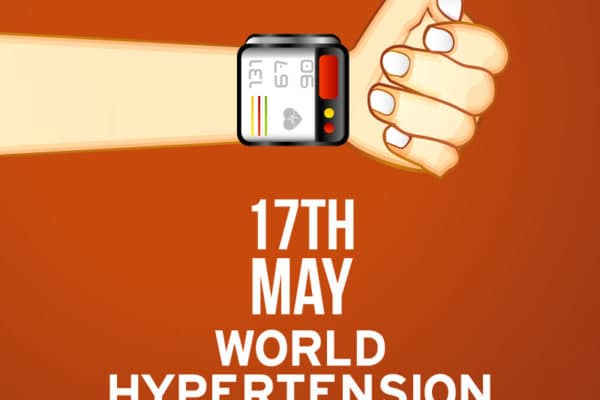
WORLD HYPERTENSION DAY
WORLD HYPERTENSION DAY
Blood pressure is a measure of the force that our heart use during pumping blood, which carries energy and oxygen around the body, this process require the availability of certain pressure inside the blood vessels, but in case the pressure inside these blood vessels increase, it will put extra strain on your heart and blood vessels, which will lead to another dangerous health issues such as, heart attack, heart failure, kidney disease, brain strokes, or dementia.
Blood Pressure Measurement
Blood pressure is recorded in millimeters of mercury (mmHg), and the reading is registered in the form of two figures:
Systolic pressure: is the force at which your heart pumps blood around your body
Diastolic pressure: is the resistance to the blood flow in the blood vessels.
The ideal blood pressure measurement is less than 120/80mmHg. Low blood pressure occurs if this measurement less than 90/60mmHg were high blood pressure present in case if it is higher than 140/90mmHg.
Hypertension Symptoms
No clear symptoms available to indicate the presence of high pressure, therefore blood pressure measurement is considered the only way to reveal any changes in the blood pressure measurement inside the body. It is a very easy procedure that every adult must do on a regular basis once every 3 – 5 years, and in case that the factors that increase the risk of high blood pressure it must be conducted at least once a year.
Factors that increase the risk of high blood pressure
– Age higher than 65 years old
– Overweight and obesity
– A family history of hypertension
– Consuming too much salt
– Not having enough quantities from fruits and vegetables
– Insufficient physical activity
– Smoking
– Consuming too much coffee and other drinks which contains caffeine
– Being of African or Caribbean origin
Hypertension complications
High blood pressure, in the long term, put extra strain on the heart, blood vessels and other organs, such as brain, kidneys, and eyes; continuous high blood pressure increase the risk factors for dangerous health issues that might be life-threatening such as, heart diseases, brain strokes, kidney failure, and blindness.
Hypertension prevention
The first step in controlling and preventing high blood pressure is detecting hypertension through regular measurements to blood pressure levels, also healthy life style reverts to human with a lot of advantages and benefits, and preserve him from the risk of many diseases including maintaining blood pressure within normal ranges, this is done by reducing the amount of salt consumed, eating low fat and balanced food which contains proper amounts of fresh fruits and vegetables, maintain regular physical activity which help in protecting the heart and maintaining healthy weight, reducing the amount of caffeine consumed in coffee and tea and other drinks, and having enough sleep as lack of sleep contribute on the long term in causing hypertension.
Small steps needed to prevent high blood pressure, but their effect is great in maintaining good health, so together let us consider the World Hypertension Day as a reminder to all of us, about the great importance to start taking these measurements to protect ourselves from hypertension and its complications and to take the right steps toward healthy bodies.
Sources:
1. World Health Organization, World Health Day 2013: measure your blood pressure, reduce your risk, [online] available at:
http://www.who.int/mediacentre/news/releases/2013/world_health_day_20130403/en/
2. King Abdullah bin Abdulaziz Arabic Health Encyclopedia, translation from Hypertension, 23 October 2017, [online] available at :
https://kaahe.org/ar-sa/Pages/Disease/%D8%A7%D8%B1%D8%AA%D9%81%D8%A7%D8%B9-%D8%B6%D8%BA%D8%B7-%D8%A7%D9%84%D8%AF%D9%85.aspx
3. NHS Choices, What is blood pressure, 26/08/2016, [online] available at:
https://www.nhs.uk/chq/Pages/what-is-blood-pressure.aspx?CategoryID=201&SubCategoryID=201
4. NHS Choices, High blood pressure, 15/06/2016, [online] available at:
https://www.nhs.uk/conditions/high-blood-pressure-hypertension/causes/


